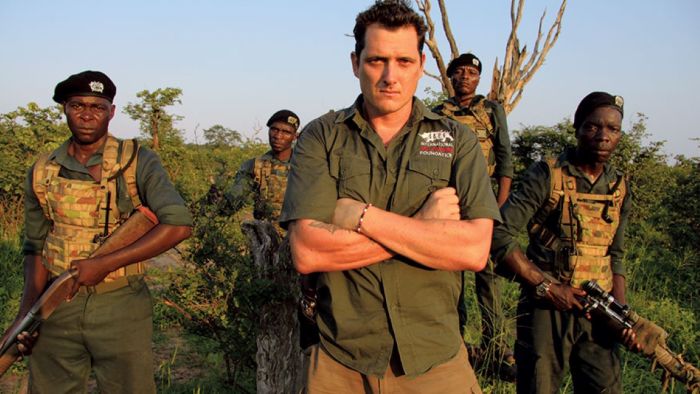

Damien Mander was an Australian special forces sniper and clearance diver before he went to African looking for adventure.
He was going to fight poachers.
When he arrived it didn’t take long for him to realise there was more to life than scratching your own itch.
“Seeing animals killed like that, seeing their face shot off for a tusk or for a horn, sort of hit me in a way that nothing in Iraq [did],” he told Hack.
“Just the innocence of animals, they don’t want anything else in life other than to live.”
He decided to put his money where his mouth is, sold up his Australian investment properties, and poured everything into establishing the International Anti-poaching Foundation (IAPF).
“I had two things, I had skills and I had money, and it’s unfortunate that those sort of skill-sets that I have are required to protect wildlife but this is the world that we’ve created for ourselves to manage and the most effective thing I can do now with the skills I have is to be over there protecting animals.”
And yes, when Damien’s rangers come across a group of poachers, it can get ugly.
“It’s a shit situation. Look, another billboard, another workshop, another conference, is not going to save an animal today, another rhino or an elephant.
Ivory up in smoke
Damien’s anti-poaching mission is no mean feat. Interpol estimates the trade of illegal wildlife is worth between $10-$20 billion a year and Africa is a major target.
According to the African Wildlife Foundation the Black Rhino population has fallen by 97 per cent since 1960, there’s fewer than 900 mountain gorillas left and up to 35,000 elephants were killed last year.
Over the weekend Kenya set fire to more than 100 tonnes of ivory to send a message. As plumes of smoke billowed from the confiscated product the country called for a complete ban on the ivory trade, a driver of elephant poaching.
It wasn’t just $130 million of black market ivory that went up in flames; 1,350 kilograms of rhino horn were burnt too. Horn that would have attracted a bit over $100 million if sold illegally.
While there’s been a ban on the sale of ivory since 1989, the Convention on International Trade in Endangered Species of Wild Fauna and Flora has permitted one-off sales. China allows sales of ivory bought before 1989, but activists say these just provide a cover for illegally traded products. Kenya wants a total ban.
As well as China, Vietnam is a major driver of the ivory trade. China has promised to outlaw it, but hasn’t announced a timeframe for the end of the trade.
As the IAPF works in Africa to stop poachers Damien Mander tells Hack there are other organisations working to disrupt the markets for these illegal products.
“There’s no one solution to this, this is something that has to be tackled from multiple angles, we don’t know how long demand reduction is going to take or if it’s ever going to take effect so our job is to hold on to what we have left.”
It’s been seven years since Damien set up the IAPF and while he expects to fight poachers for the rest of his life he doesn’t regret his decision.
Read and see the full story: http://www.abc.net.au/triplej/programs/hack/the-australian-soldier-leading-africas-poaching-fight/7375456
